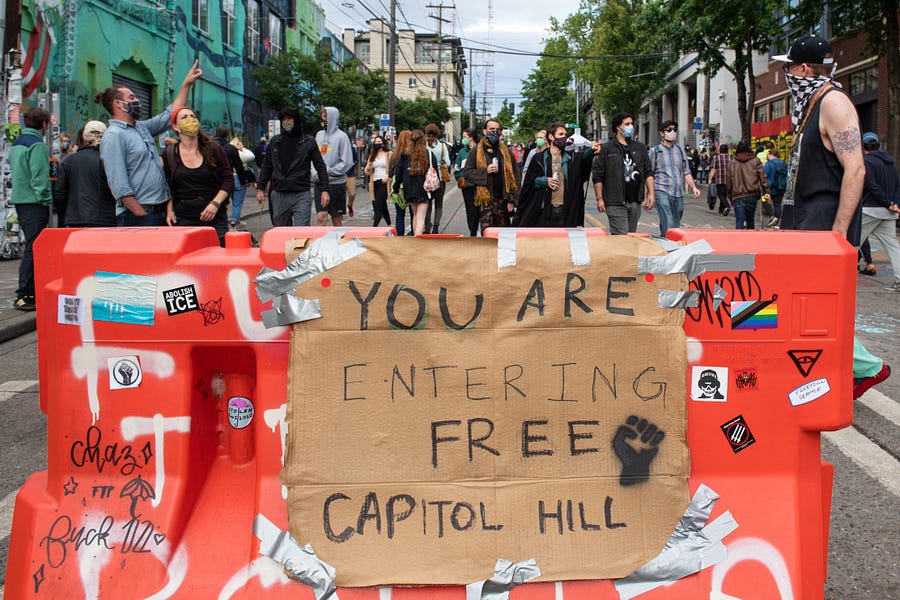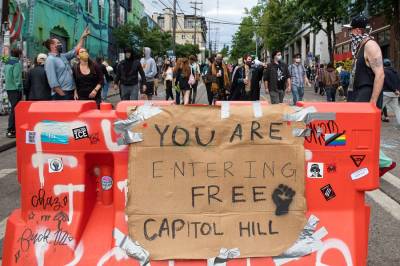A meteor the size of the Empire State building missed Earth last week, and scientists assure us that an ongoing earthquake swarm in Yellowstone is totally normal and not the sign of a coming extinction-level volcanic eruption. But at this point, would it even surprise you?
Think about it. We’ve lived through three major events that would be the defining story of any normal decade, and we’re only six months into the first year of the 2020s. We kicked off January with Donald Trump’s impeachment trial, which quickly became small potatoes when the pandemic hit our shores and upended everything. And now we are experiencing the most significant race protests since 1968.
Can we exhale yet?
I won’t sit here and say “I’m exhausted.” I’m not a health care worker. My family doesn’t run a business that was threatened by a monthslong shutdown. I don’t have to worry that when our kids leave the house they’ll experience racial taunts or fear that they’re going to have a violent encounter with police. I’m not even trapped in a Seattle apartment while a bunch of activists cosplay as revolutionaries on the streets below.
But the constant demands on our attention from these events are wearying. Yeah, we all lamented when cable news created the 24-7 news cycle and it seemed like we were always being bombarded with news. And then social media came along and accelerated things to the point it felt like were permanently stuck on the Gravitron at the county fair. But let’s be honest. Except for truly world-changing events (wars, 9/11, natural disasters like Hurricane Katrina), we didn’t have to pay attention every single minute. There was plenty of filler.
Now it feels like we have a constant stream of events that require our attention. It’s not only impossible to ignore them, it’s irresponsible. And yet I worry we are losing our chance to properly process them, to take away the lessons that will shape how we move forward. We’re still learning about coronavirus and how it spreads and it’s nowhere near done, and yet once the protests started after Geroge Floyd’s death, so many took that as an excuse to act like the pandemic was over. That’s not an indictment of the protests—they were an understandable response to a horrific event and will hopefully lead to real change—just an observation about the public’s response.
It does seem like the protests have the potential to bring forth real progress. Studies have shown that the attitudes of white Americans are changing, and quickly. We have a chance to reform policing and our criminal justice system. But I worry that even this will get away from us. While some people are talking about concrete and realistic policy proposals, others are talking about defunding the police. While peaceful demonstrations are taking place even in small towns and quiet suburbs, the protests have come for Paw Patroland a bunch of activists have taken over part of a neighborhood in Seattle and, frankly, are making a mockery of things (Jonah has more below).
In the meantime, here at The Dispatch, we’ll continue to try to put these events in their proper perspective, to take a look at the big-picture issues and what we should take away from them. We’ll be patient even amid panic. If you haven’t joined us yet, please consider doing so.
Here’s the best of our stuff from another crazy week.
One of the more frustrating aspects of our polarization—a nail I tend to hammer on a little more than I’d like—is that it makes it so difficult to have a rational debate on policy choices. And in the wake of nearly three weeks of protests over the death of George Floyd, some on the left are now calling to “Defund the Police.” Which is unfortunate because, as David French points out in a midweek members-only French Press, there are a lot of reforms we could make: We could end qualified immunity (an explainer on that here), end civil forfeiture, and limit both no-knock raids and cash. The best part is that there is a conservative—and constitutional—case to be made for all of these issues.
In what feels like an obvious response to the nationwide protests that saw demonstrators marching side by side, often without masks, during a time when states are still limiting large gatherings, Donald Trump announced he would be resuming rallies next week. (He has since announced he will reschedule his rally planned for Tulsa on June 19 for June 20.) Andrew Egger talked to a group of Trump superfans who call themselves Front Row Joes, about what they get out of attending every rally they can, and whether they had concerns about going while coronavirus is still ascendant in many places. “ I know our president needs to see his base, and the base needs to see him,” said the group’s unofficial leader, Randall Thom. “We love him, we do. He inspires us, and we know when we’re at that rally, our job is to inspire him. We can tell that he’s missing interacting with us. I mean, they’ve had him locked away from who he’s fighting for.”
There’s an old adage in media—or at least there used to be, before the news cycle went 24-7-365, that interns ran the newsrooms in the month of August. It’s a slow month for national politics, there’s a lull in the sports world, and much of America is on vacation. But, heck, here at The Dispatch we gave the keys to summer fellow Nate Hochman right away. Nate dove headlong into the many contradictions of New York City Councilman Mark Levine. Back in early March, Levine encouraged people to come to the crowded Lunar New Year celebrations in New York and complained of coronavirus scare-mongering. But then he found his voice criticizing the Trump administration’s lax response and called for strict lockdowns. Until, that is, the protests began.
Picking a favorite G-File is a little bit like picking a favorite kid. It’s just too difficult. And so it’s better to have favorites by category. You can have a favorite “most enlightening” column, or “most heartwarming” (that would be the Story of Zoë). Let’s call this week’s the most amusing. Jonah takes on the nonsense in the Capitol Hill Autonomous Zone in Seattle, and he has thoughts. He recounts how the police chief, in a gesture of goodwill, removed police barricades only to watch as the demonstrators erected their own. “Once they erected their own politically correct barricades, as Item One of Infrastructure Week in their Polizeifrei podunk, they posted a sign that reads, ‘You are now leaving the USA.’ And note, it’s not just an abstract border. They built a frick’n border wall!” Seriously, read the whole thing.
And now for the best of the rest of our stuff.
Alec Dent, fact checker by day, film noir buff by night. In a special weekend piece for the site, he reviews the 1950 film Panic in the Streets. It’s about a pandemic and … contract tracing. Really. Look for more weekend cultural coverage from The Dispatch coming soon.
In case you’ve forgotten (it’s easy to do so), there’s still a presidential campaign going on. And in an election “defined by a pandemic, mass unemployment, and a citizenry increasingly coming to terms with racial injustices,” Donald Trump should be concerned that polling shows that he has an empathy gap with Joe Biden. Declan Garvey explains.
We can all agree that our forced experiment in virtual learning was … not a rousing success. Now educators face a big problem: What to do about kids who were already behind, or fell so far that they really shouldn’t advance? Frederick Hess and Brendan Bell look at the possibilities.
President Trump has issued his share of controversial executive orders. One recent one bans some Chinese students from U.S. universities. But as Thomas Joseclyn explains in a members-only Vital Interests, some of those students aren’t here just for a degree: They have ties to the Chinese military and are after our technological secrets.
Special announcement: Dispatch writer Sarah Isgur and her husband welcomed a son, Nate, yesterday. We’re not sure when “Lil Brisket” will make his Dispatch Live debut, but we’ll let you know.
On the pods: Is this moment, in the wake of George Floyd’s death, different? The gang discusses on The Dispatch Podcast. Meanwhile, on her last day before motherhood, Sarah talks with David about Confederate monuments, Tom Cotton, and Gone With the Wind on Advisory Opinions. And on The Remnant, Jonah had a fascinating conversation with Oriana Skylar Mastro about how China is trying to take advantage of the U.S. retreating from its global responsibilities.
Photograph by Noah Riffe/Anadolu Agency via Getty Images.







Please note that we at The Dispatch hold ourselves, our work, and our commenters to a higher standard than other places on the internet. We welcome comments that foster genuine debate or discussion—including comments critical of us or our work—but responses that include ad hominem attacks on fellow Dispatch members or are intended to stoke fear and anger may be moderated.
With your membership, you only have the ability to comment on The Morning Dispatch articles. Consider upgrading to join the conversation everywhere.